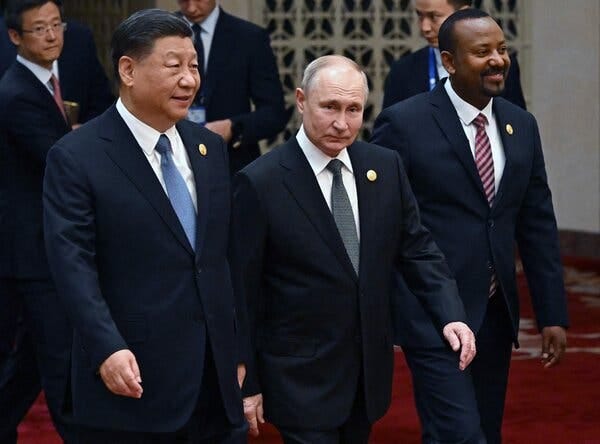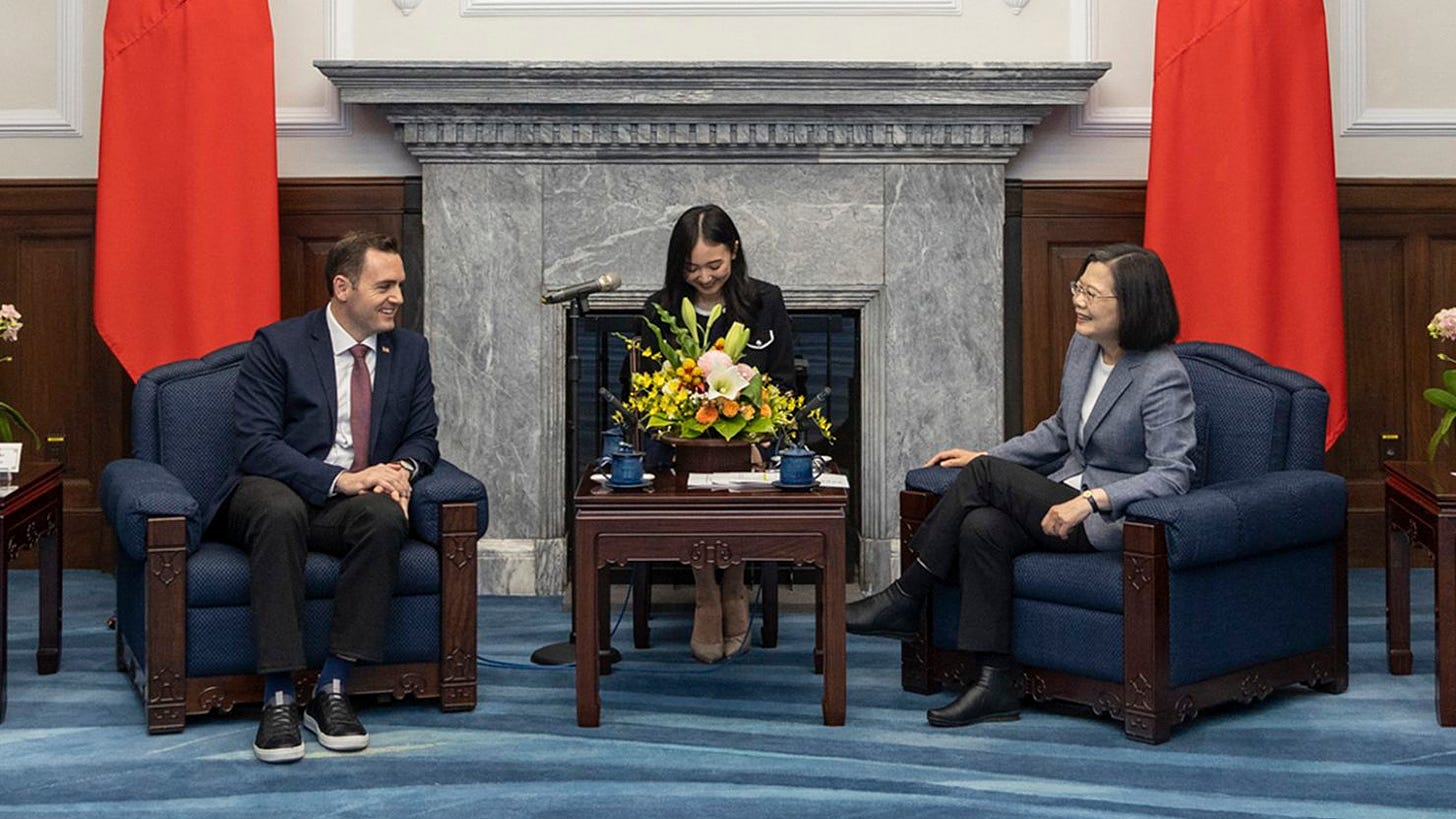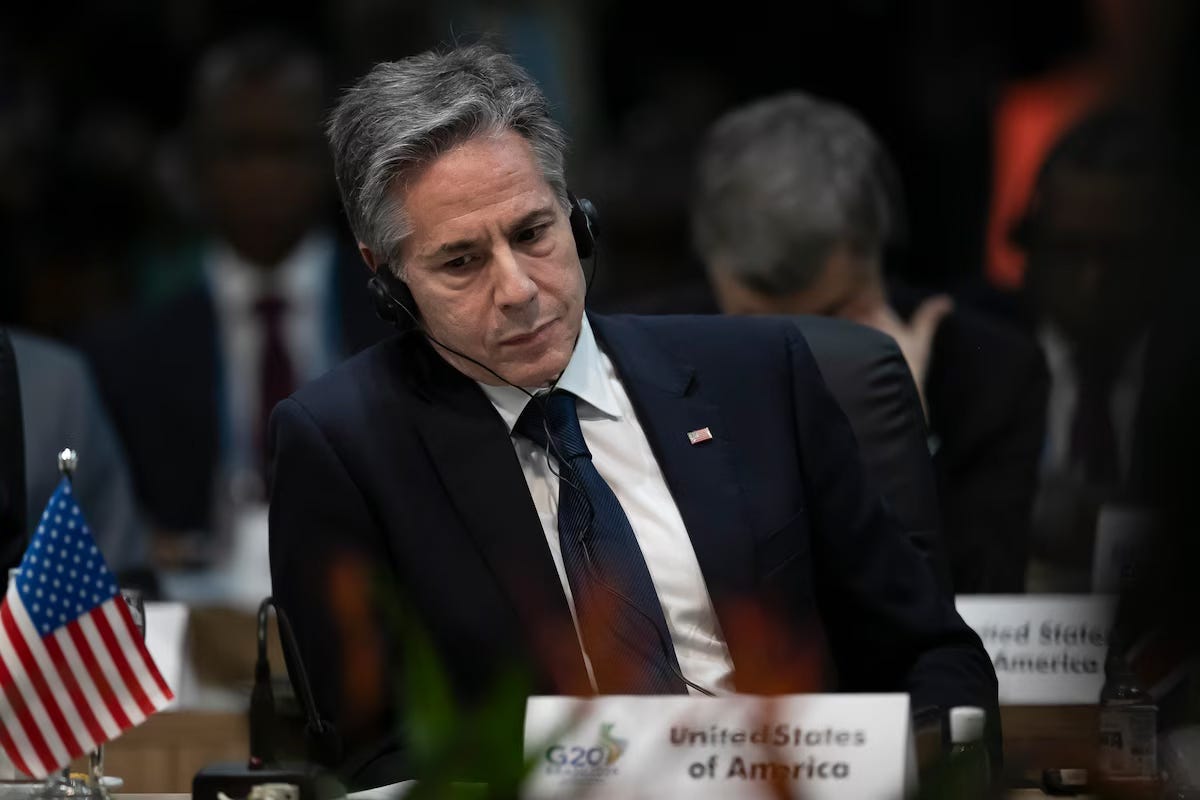UPDATES: US will support Taiwan regardless of election results, Rep. Gallagher says on visit to island
During a G-20 meeting in Brazil, the U.S. faced criticism for opposing an immediate cease-fire in Gaza. The Brazilian host and diplomats from various countries, including close ally Australia, expressed concern over the loss of innocent lives. Accidentally broadcast remarks revealed global dissatisfaction with the U.S. stance on the Gaza conflict, contrasting with the unity seen in the previous year over Russia's invasion of Ukraine.
Two years later, Mr. Putin is not nearly as isolated as U.S. officials had hoped. Russia’s inherent strength, rooted in its vast supplies of oil and natural gas, has powered a financial and political resilience that threatens to outlast Western opposition. In parts of Asia, Africa and South America, his influence is as strong as ever or even growing. And his grip on power at home appears as strong as ever.
Taiwan's President Tsai Ing-wen meets with Rep. Mike Gallagher in Taipei on February 22. Taiwan Presidential Office/AP (Taken form CNN)
US will support Taiwan regardless of election results, Rep. Gallagher says on visit to island
By Eric Cheung, Nectar Gan, Wayne Chang and Simone McCarthy
American support for Taiwan will continue no matter who wins the upcoming US election, House Rep. Mike Gallagher told an audience in the democratic island on Thursday, as tensions simmer between Taipei and Beijing.
“I’m confident regardless of how the presidential election goes, we will maintain our support not only for Taiwan but also a posture of internationalism and engagement,” Gallagher told reporters in the capital Taipei.
The lawmaker, who chairs the House of Representatives select committee on China, is leading a five-member bipartisan delegation on a three-day visit to self-ruled Taiwan.
The trip comes amid a period of heightened tensions between Taipei and Beijing, following the deaths last week of two Chinese fisherman Taiwan said trespassed into protected waters.
China’s ruling Communist Party claims Taiwan as its own territory, despite never having controlled it, and has vowed to take the island – by force if necessary.
Gallagher said American efforts to support Ukraine’s defense against Russia’s invasion were also critical to deterring Beijing from using force against Taiwan.
“The outcome in Ukraine matters not only for Ukraine and American credibility, but for deterrence in the Indo-Pacific, for cross-strait deterrence,” the lawmaker said.
US funding for Ukraine has been mired in political infighting in Congress, where a contingent of Republicans are resisting additional aid, encouraged by presidential candidate Donald Trump.
Trump is widely expected to face off against incumbent Joe Biden in the presidential elections in November.
The potential return to office of the former president, who earlier this month said he would not defend NATO allies that failed to spend enough on defense, has raised concerns in Europe about continued US support for Ukraine.
Speaking alongside Gallagher in Taipei, Raja Krishnamoorthi, a Democratic congressman, also told reporters in the same news conference that Washington “can’t be tough on China and weak in your support of Ukraine … you can’t be inconsistent.”
Read more
Secretary of State Antony Blinken attends the G-20 foreign ministers’ meeting in Rio de Janeiro on Feb. 21. (Bruna Prado/AP) (Taken form The Washington Post)
U.S. isolated at G-20 as Gaza crisis worsens
By John Hudson
The U.S. opposition to an immediate cease-fire in Gaza came under repeated criticism during a two-day meeting of the chief diplomats of the world’s 20 largest economies in the latest sign of Washington’s isolation on the issue.
Brazilian Foreign Minister Mauro Vieira, the host of this year’s annual Group of 20 gathering, began the meeting by decrying the “paralysis” at the United Nations Security Council, where Washington vetoed a third resolution for an immediate cease-fire in Gaza earlier in the week.
“This state of inaction results in the loss of innocent lives,” Vieira said.
The top diplomats at the gathering, which included Secretary of State Antony Blinken and Russian Foreign Minister Sergei Lavrov, offered their views on various geopolitical issues in a session that was closed to the media so officials could express themselves more candidly.
But by mistake, a small group of journalists, including from The Washington Post, were able to listen in on the session because the audio headsets continued broadcasting the remarks, unbeknownst to the Brazilian hosts.
Australia, a close ally of the United States, supported an immediate cease-fire in Gaza and strongly warned about the “further devastation” that could result from Israel’s announced military campaign in the southern city of Rafah, where more than 1 million displaced Palestinians have sought shelter.
“We say again to Israel — do not go down this path,” said Australia’s representative, Katy Gallagher. “This would be unjustifiable.”
South Africa, which has accused Israel of carrying out a genocide in Gaza, a charge Israel strenuously denies, said world leaders had “allowed impunity to hold sway.”
“We have failed the people of Palestine,” said Naledi Pandor, South Africa’s minister of international relations and cooperation.
The accidentally broadcast remarks created a sharp contrast with the G-20 gathering in India last year, where Blinken sought to unite world powers in condemnation of Russia’s invasion of Ukraine. At the time, Blinken found a more receptive audience when he invoked the United Nations Charter and the principles of sovereignty to criticize Moscow’s land grab.
But in Brazil, diplomats invoked those same principles to criticize the ongoing war in Gaza, where the United States has provided Israel political cover and billions of dollars’ worth of bombs and military equipment.
“If, for example, we had been united” behind the “principles set out in the U.N. Charter,” said South Africa’s representative, “the tragedy in Palestine will not have lasted over three months.”
Blinken told reporters on Thursday that despite strong disagreements on an immediate cease-fire, he viewed the G-20 as largely united when it comes to goals in the conflict.
“Everyone supports trying to reach a hostage agreement. Everyone supports having an extended humanitarian ceasefire. … Everyone supports finding a way to end the conflict,” he said.
“There may be differences over over tactics … but we’re trying to focus on actually getting results,” Blinken added.
But analysts said the contrast between Washington’s global standing from one year to the next was stark.
“A year ago, the U.S. had Russia on the back foot over Ukraine,” said Richard Gowan, an expert on multilateral affairs at the International Crisis Group. “Now the Biden administration looks like it is losing its grip on events in Ukraine and Gaza, and could lose its grip on the November elections too.”
Among Latin American countries, the United States received a rare reprieve during the remarks by Argentina, whose recently-elected libertarian leader, Javier Milei, is staunchly pro-Israel.
While acknowledging that the conflict has caused a “humanitarian disaster,” Argentina’s representative condemned the “terrorist acts of Hamas” and demanded the “unconditional release of hostages.”
U.S. officials said they remained focused on working toward Brazil’s goals for the G-20, including coordination on labor practices, climate change and food security. They said they hoped that differences over Gaza would not derail those efforts, but comments from Brazil’s president days before Blinken’s arrival comparing the killing of Palestinians in Gaza to the genocide of Jews during World War II provided another obstacle.
During the top U.S. diplomat’s meeting Wednesday with Luiz Inácio Lula da Silva, Blinken “made clear that we disagree with those comments,” said a senior State Department official, who spoke on the condition of anonymity to discuss a sensitive hour-and-a-half discussion between the two leaders. “I would say the two had a frank exchange.”
As president of Latin America’s most populous country and host of the G-20, Lula has taken on an outsize role as a voice of the developing world when it comes to the wars in Gaza and Ukraine, in both cases criticizing Washington’s opposition to an immediate cease-fire.
In the meeting, Blinken made clear his view that the United States did not support an immediate cease-fire because it would leave Hamas in place to repeat attacks against Israel, said the senior official.
U.S. intelligence officials say Israel’s forces have significantly degraded Hamas’s capabilities but estimate that they are not close to eliminating the group after more than 100 days of war and nearly 30,000 Palestinians killed, according to figures from Gaza’s health ministry. The assault began Oct. 7 after Hamas fighters invaded southern Israel, killing more than 1,200 people and taking about 240 hostage.
Lula weighed in Sunday on the large number of civilian casualties in the war, accusing Israel of carrying out a “genocide” and comparing it to “when Hitler decided to kill the Jews.”
Israeli Prime Minister Benjamin Netanyahu said on social media that Lula was “trivializing” the Holocaust and “trying to harm the Jewish people and Israel’s right to defend itself.”
Blinken relayed to Lula U.S. efforts to broker a deal between Hamas and Israel that would see the release of prisoners in exchange for a humanitarian pause in fighting and an increase in humanitarian aid.
Read here

U.S. Campaign to Isolate Russia Shows Limits After 2 Years of War
By Edward Wong and Michael Crowley
The Biden administration and European allies call President Vladimir V. Putin of Russia a tyrant and a war criminal. But he enjoys a standing invitation to the halls of power in Brazil.
The president of Brazil says that Ukraine and Russia are both to blame for the war that began with the Russian military’s invasion. And his nation’s purchases of Russian energy and fertilizer have soared, pumping billions of dollars into the Russian economy.
The views of the president, Luiz Inácio Lula da Silva, encapsulate the global bind in which the United States and Ukraine find themselves as the war enters its third year.
When Russia launched its full-scale invasion of Ukraine on Feb. 24, 2022, the Biden administration activated a diplomatic offensive that was as important as its scramble to ship weapons to the Ukrainian military. Wielding economic sanctions and calling for a collective defense of international order, the United States sought to punish Russia with economic pain and political exile. The goal was to see companies and countries cut ties with Moscow.
But two years later, Mr. Putin is not nearly as isolated as U.S. officials had hoped. Russia’s inherent strength, rooted in its vast supplies of oil and natural gas, has powered a financial and political resilience that threatens to outlast Western opposition. In parts of Asia, Africa and South America, his influence is as strong as ever or even growing. And his grip on power at home appears as strong as ever.
The war has undoubtedly taken a toll on Russia: It has wrecked the country’s standing with much of Europe. The International Criminal Court has issued a warrant for Mr. Putin’s arrest. The United Nations has repeatedly condemned the invasion.
And to hear Biden administration officials tell it, Russia has suffered a major strategic failure.
“Today, Russia is more isolated on the world stage than ever,” Secretary of State Antony J. Blinken declared in June. Mr. Putin’s war, he added, “has diminished Russian influence on every continent.”
Beyond North America and Europe, there is evidence to the contrary.
China, India and Brazil are buying Russian oil in record quantities, feasting on the steep discounts Mr. Putin now offers to countries willing to replace his lost European customers. With those growing economic relationships have come strong diplomatic ties, including with some close U.S. partners. Mr. Putin visited Beijing in October and hosted India’s foreign minister in Moscow in late December. A few weeks earlier, Mr. Putin was warmly received in Saudi Arabia and the United Arab Emirates, where he was greeted with a 21-gun salute and fighter jets overhead trailing smoke in the red, white and blue of Russia’s flag.
Russian influence is also expanding in Africa, according to a new report from the Royal United Services Institute, a security research group based in London. When Yevgeny V. Prigozhin, the leader of the Wagner mercenary group, died last summer, Russia’s military intelligence service took over Wagner’s extensive operations in Africa and made further inroads with governments that rely on the group for security.
“By no means is Russia boxed in,” said Michael Kimmage, a Cold War historian at the Catholic University of America who was a State Department official in the Obama administration. “It’s not boxed in economically, it’s not boxed in diplomatically and it gets its message out on the war.”
To some Russia experts, American and European leaders have not fully reckoned with this reality.
“What Western leaders conspicuously haven’t done is level with their publics about the enduring nature of the threat from an emboldened, revisionist Russia,” Eugene Rumer and Andrew S. Weiss of the Carnegie Endowment for International Peace wrote in November in an essay for The Wall Street Journalaccusing the West of “magical thinking” about Mr. Putin’s plight.
A prime example of the disappointment is Mr. Putin’s welcome mat in Brazil, Latin America’s largest and most globally influential nation.
Mr. Lula has extended an invitation to Mr. Putin to attend a Group of 20 leadership summit in Brazil in November, even though his country is a member of the International Criminal Court and is obliged to enforce the court’s arrest warrant for the Russian leader. (Mr. Lula sidestepped questions in December about whether Mr. Putin would be arrested if he showed up, calling it a “judicial decision.”)
Brazil’s persistently neutral stance on Russia’s war in Ukraine came up in a meeting on Wednesday in Brasília, the nation’s capital, between Mr. Lula and Mr. Blinken. Mr. Lula has called for peace talks, a position that Ukraine has criticized, and has said the United States is fueling the war with its weapons shipments to Kyiv. Mr. Blinken told Mr. Lula that the United States did not think conditions were right for diplomacy now.
Later that day, Mr. Blinken landed in Rio de Janeiro for a meeting of foreign ministers from the Group of 20 nations and heard Brazil’s top diplomat, Mauro Vieira, say, “Brazil does not accept a world in which differences are resolved by using military force.”
Sergey V. Lavrov, Russia’s foreign minister, was present. While Mr. Blinken and a handful of counterparts from allied nations denounced Russia’s war, the other officials followed the Brazilian minister’s lead in voicing neutral sentiments or stayed silent on the conflict.
At a news conference on Thursday, Mr. Blinken asserted that Mr. Lavrov had heard criticism throughout the meeting, saying there was a “very strong chorus” that spoke on “the imperative of ending the Russian aggression.”
Last year, Mr. Lavrov attended a similar event in India. He visited more than a dozen African nations in 2023, including South Africa, Sudan and Kenya. And he was welcomed last April by Mr. Lula at the presidential residence, and was expected to see the Brazilian president again in Brasília on Thursday.
He met in New York last month with António Guterres, the secretary general of the United Nations — which Russia’s foreign ministry advertised in a news release that showed the two men shaking hands.
At the United Nations, U.S.-led resolutions condemning the war have found little support among countries that are not closely aligned with the United States or Russia, demonstrating their reluctance to be forced to take a side in the conflict.
“These countries are wary of being seen as pawns on a chessboard of great-power competition,” said Alina Polyakova, the president of the Center for European Policy Analysis in Washington. “The last administration did a lot of damage to our relationship with a lot of these countries. We haven’t been seen as a credible partner.”
“Russian disinformation has been effective in a lot of places,” she added. “And in a lot of these countries, Russia has invested for decades.”
Moscow has also worked to avoid blame for higher food and energy prices that followed its invasion. Several weeks ago, Russia delivered 34,000 tons of free fertilizer to Nigeria, one of several such shipments it has sent to Africa.
Mr. Putin can afford such largess, not to mention a war of attrition in eastern Ukraine, because Russia has replaced lost energy customers in Europe by selling far more on other continents. The International Energy Agency reported last month that Russia exported 7.8 million barrels of oil per day in December, the highest in nine months — and only slightly below prewar levels.
At the same time, its oil export revenues were $14.4 billion that month, the lowest in a half-year. The agency said Western efforts to enforce a price cap on Russian oil appears to have bitten into overall revenues, as has a decrease in the global market price of crude oil.
Russia’s standing is benefiting from President Biden’s support for Israel’s war in Gaza, analysts say. Many leaders see hypocrisy in American condemnations of Russian strikes on civilian areas and infrastructure in Ukraine, unmoved by the argument that Israel works to avoid civilian casualties while Russia has deliberately targeted innocents.
Beyond that, Russia has succeeded in forming tighter bonds with its close partners, what Ms. Polyakova calls a “new authoritarian alliance.” Those countries — China, North Korea and Iran — have given aid to Moscow in various forms. North Korea is sending ballistic missiles for use in Ukraine, Iran continues to ship drones and China, while refraining from exporting arms to Russia, is allowing equipment that civilians and the military can use to get into Moscow’s hands.
Read more





